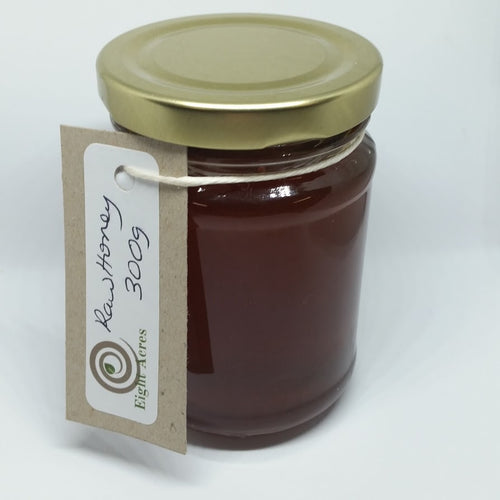Where can you get pure raw Australian honey?
You might have seen the recent news that some of the cheapest honey on Australian supermarket shelves is blended with Chinese honey and that testing has shown that half the samples of these honey were “adulterated”. That means that they contained sugars that were not from honey, more likely from syrups made from corn, wheat and rice.
What is honey?
Bees make honey by collecting nectar from flowers, they carry it home in their guts and regurgitate the nectar into cells in the honeycomb (honey is basically bee vomit). As part of this process, the bees add an enzyme which breaks sucrose into fructose and glucose.
The bees then concentrate the nectar by evaporating the water (by fanning the honey combs with their wings). When the honey reaches the ideal water content for storage, they seal off each cell with beeswax to store it, so that they can eat the honey later when nectar production is lower.
We take advantage of this by taking the frames of sealed honey comb, cutting off the capping beeswax and extracting the honey (how to harvest honey). Fortunately we have bred honeybees to hoard more honey than they need (and sometimes if we misjudge, we have to feed them sugar water so that they don't starve).
But honey is not simply a mixture of sugars in water, it also contains all the minerals, enzymes, vitamins and amino acids found in the nectar, as well as pollen and beeswax (and no doubt some dirt and bits of bees). Honey is also known to have anti-microbial properties, particularly New Zealand's manuka honey.
What is commercial honey?
While some beekeepers sell direct to the public, many of the larger beekeeper will sell to a processor. They get a lower rate for their honey, but it helps to move the large amounts (tonnes) that they produce more quickly than selling 1 kg at a time. The honey produced by commercial honey processors is usually heat-treated and filtered to removed all traces of pollen and beeswax, as these small particles can cause the honey to crystallise over time.
The honey is also a blend of all the different honey received from different beekeepers from various locations. The goal is to produce a blend so that every batch has a consistent colour and flavour.
Some commercial honey is also blended with imported honey (mostly from China) and these products can be of dubious quality. It can even contain syrups made from grains (a mixture of maltose and glucose). This is typically the cheapest honey in the supermarket.
Why buy from a local beekeeper?
While it may be convenient (and cheap) to buy honey from a commercial processor at the supermarket, the other option is to support your local beekeeper.
If you buy local honey:
- You get to appreciate the variation in taste from different seasons and locations (new word: apisoir (listen to this podcast about the taste of different honey locations)
- You support a small local business or a hobby producer
- The honey is more likely to be raw (not heat treated) and contain local pollen, which is good for hayfever
- It might crystallise, but is that such a bad thing? I have one customer who requests crystallised honey!
- You can buy in recycled glass containers rather than new plastic jars (I love it when people bring their own jars)
- You can learn about bees by chatting to the beekeeper (hint: the best way to save the bees is to plant some flowers!)
- And you can find out if they use any chemicals in their hives (yep, even though we don't have varroa mites here, its common for the big producers to put insecticides and antibiotics in their hives - more about that here and here)
Remember that a honey bee only makes one twelfth of a teaspoon of honey in her six week lifetime. And extracting honey is hard work for the beekeeper too! I have the stings to prove it. Honey should be treasured and valued, and should never be a cheap commodity. If you just want something sweet and tasteless for your tea, use sugar (or rice syrup!), if you want to appreciate the unique apisoir of your local beekeepers, then buy some quality raw honey and savour the taste.
How can you find a local beekeeper?
- Try your farmers market
- We have lots of local honey available in shops around our town
- Online: Aussie Apiarists Online , Bee the Cure Honey Map
- Contact you local beekeeping club
- Ask around - someone will know a beekeeper!
- You can also order my honey online, while it lasts....
Where do you buy your honey?























Liz, I buy my honey from a local producer. I don’t eat it but hubby loves the taste of the honey he buys locally.
i love bees & love their honey! i try to grow flowers here but my lavender & rosemary are about the only surviving flowers here atm (drought dry here) i am hoping to try one of those free flow hives sometime in the future (when i can afford to buy one) but for the time being i get my honey from 2 sources, the local butcher sells a local honey & i have a friend when he’s here that i get my honey from during the warmer months, i buy a 15kg bucket from him usually. i go through a lot of honey, buying 2kgs a week atm. have it in nearly everything, even cook with it.
great post
thanx for sharing
Leave a comment